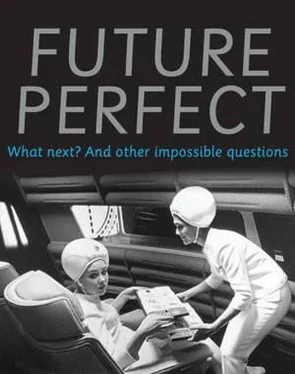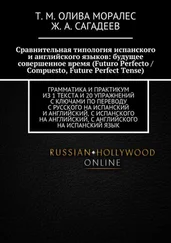
Robyn Williams
Future Perfect
This is the first age that’s ever paid much attention to the future, which is a little ironic since we may not have one.
– Arthur C. Clarke
Introduction – Plus ç a change!
The sun goes up
The sun goes down
The hands on the clock go round and round…
Thinking about the future is not a normal human activity. This may seem weird. Why would the most intelligent and imaginative species in the known universe insist on being stuck in the present, marooned in the past?
It is not so surprising when you look at the conundrum personally and historically. During the first 200,000 years of human existence not much changed. Yes, we did nip out from Africa across the globe, occupying six continents, but that took aeons. The average lifetime of 30-odd brutish years saw little variation beyond volcanic eruptions or freak weather. Otherwise, in a world uniformly hostile to human existence (not for one moment to be underestimated!) the struggle was to keep your hairy and heavy-browed self alive and ready
Future Perfect for tomorrow’s quest for dinner. Five-minute plans were occasionally legitimate; five-year plans out of the question.
About 35,000 to 40,000 years ago, in several parts of the world, something changed. We invented culture. In both Australia and Europe cave paintings show a new sophistication, probably linked to the development of complex language. Leaving aside how this may have happened at the same moment among people so far apart, it is interesting that the works reflect a life integrated with the animals they depict and with landscape. The only gesture towards a hypothetical future is seen in religious iconography as we began to wrestle with the consequences of death and alternatives to oblivion. Life was still brutish and short, just better decorated. It was essentially reactive; innovations such as fire and cooking occurred only too rarely and (according to Professor Richard Wrangham at Harvard) were more a matter of improvisation than planning.
Which brings us to the beginnings of agriculture and civilisation, about 10,000 years ago. One imagines our clever forebears mucking about in the fields with crops and creatures, noticing the potential of full-scale farming, with its greater yield and fixed addresses, and so being inspired to take appropriate measures, fine-tuning as they went. Not so. The latest archaeological information indicates that agriculture was a desperate recourse in the face of environmental catastrophe. With far fewer berries to pick and beasts to hunt, our benighted ancestors had little choice but to plant seeds and herd goats as a last resort. The penalties for doing so, as Jared Diamond has pointed out, were poorer health and the onset of plagues.
Even then, with villages and farms and the gradual invention of necessary hardware, not much varied from day to day between the toil of sowing, the grind of harvest and periodic relief at festival time when peasants gathered for a grim romp. Seasons came and went, the ruling classes took their unfair cut; life went on. Only the odd battle or skirmish with neighbours gave some respite from the relentless repetition of everything, and only the occasional preparation for wars or strategic marriages showed much long-term planning. Even great cathedrals took hundreds of years to rise, outlasting in their construction those who had conceived them. Tomorrow always belonged to someone else.
Of course, there were prognosticators and seers, from the authors of the Bible to operators like Nostradamus, but they were less involved with ideas about a better future and more concerned with keeping the troops under control. The whole basis of belief in the hereafter and the awesome sway of the Almighty was that this world was but a temporary staging post; it was what happened next that really mattered. Utopias were beside the point. Present-tense dystopias were far more useful as frighteners than some benign promised land. This life is but a vale of tears, the message went: rewards will come in the next life. So fall in line, get on with it and accept your miserable lot. Trust me!
Even those prime innovators the Chinese were far more interested in maintaining the genuflecting obedience of the masses to whichever panjandrum happened to occupy the celestial throne than in exploiting the native inventiveness all around them. So it was that technologies that could have been adapted in a thousand brilliant ways (paper, magnetic compass, sandpaper, water-driven clocks, wallpaper, earthquake detectors, noodles, paper money, toothbrushes, playing cards, gunpowder, printing, movable type) were allowed to languish until rediscovered in Europe hundreds of years later. The people were endlessly creative but the leaders were rigid, like great Confucian statues, and society stayed much the same. In old China the motto might have been plus ça change, plus c’est la même chose !
Not until after the devastation caused by plague in the fourteenth century were people forced to imagine a different way of doing things. From Florence, where nearly 80 per cent of the population perished, to parts of northern Europe where the figure was a scarcely less chilling 20-30 per cent, people had to adapt to a new reality. Where labour had once been in unlimited supply, now labour-saving devices were needed. Science and technology emerged as vital to survival and, with them, the twin requirements to think ahead and maintain an anti-authoritarian scepticism. Imagine how powerful this experience must have been. Practical inventiveness was needed to stay alive and new ideas had to flow to deal with a world that had been turned upside down. Put them together and you have what eventually became the Enlightenment. This new freedom was the birth of modern science. Before then, pure science had not been theoretical musings, like those of a Stephen Hawking or a Paul Davies, which were then taken up and tested by the experimentalists. Pure science had been what relaxed classical gentlemen did lounging by the grotto without getting their hands dirty . Aristotelian science was more like philosophy, a matter of the high-minded gaining insight into the perfection of nature and the universe. Labs were for proles. The Enlightenment changed everything. Novel thinking was prized: the more daring the better. But so was experimentation. Hands-on was combined with minds freed. Galileo, the father of modern science, was a rebel to classical science; his cosmology affronted the Church, but that didn’t worry him.
Such is history: long stasis, giving way to rapidly accelerating change. Of the four hundred generations since the start of civilisation, only about seven or eight generations, beginning at the end of the eighteenth century with the start of the industrial revolution, have witnessed rapid social change. Before then we never had reason to think that profound change was possible, so dwelling on possible futures seemed the province of wastrels and effete poets. Besides, most people prefer things to stay much the same. Upheaval is discombobulating.
Which brings me to the personal. My own family has a poor history of longevity, especially on my father’s side. Men would typically expire of spectacular strokes in their forties; even my father, whose time on Earth was slightly more comfortable than that of his brothers, expired at age 57. I am now six years older than he was when I last saw him, a somewhat creepy experience.
Seeing oneself as a sprinter in life gives little encouragement for pondering the future. Quite the reverse: a kind of resigned stoicism rules instead. Add to that the common refrain of the 1960s, when I was passing my majority, that one should ‘not trust anyone over the age of 30’ and you can well understand our lazy, arrogant belief that the future would take care of itself. Then comes the selfishness of age. I may have only ten weeks, ten months or ten years left, so it is easy to say that global warming and Holy War are your problems, bambino! And yet…
Читать дальше













